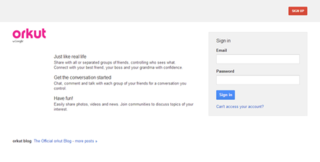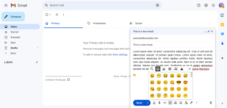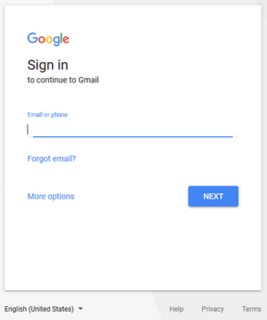
Google Search is a search engine provided by Google. Handling more than 3.5 billion searches per day, it has a 92% share of the global search engine market. It is also the most-visited website in the world.

Orkut was a social networking service owned and operated by Google. The service was designed to help users meet new and old friends and maintain existing relationships. The website was named after its creator, Google employee Orkut Büyükkökten.

Gmail is a free email service provided by Google. As of 2019, it had 1.5 billion active users worldwide. A user typically accesses Gmail in a web browser or the official mobile app. Google also supports the use of email clients via the POP and IMAP protocols.
Internet privacy involves the right or mandate of personal privacy concerning the storing, repurposing, provision to third parties, and displaying of information pertaining to oneself via Internet. Internet privacy is a subset of data privacy. Privacy concerns have been articulated from the beginnings of large-scale computer sharing.

Google Reader was an RSS/Atom feed aggregator operated by Google. It was created in early 2005 by Google engineer Chris Wetherell and launched on October 7, 2005, through Google Labs. Google Reader grew in popularity to support a number of programs which used it as a platform for serving news and information to people. Google closed Google Reader on July 1, 2013, citing declining use.

Google Analytics is a web analytics service offered by Google that tracks and reports website traffic, currently as a platform inside the Google Marketing Platform brand. Google launched the service in November 2005 after acquiring Urchin.

Google Calendar is a time-management and scheduling calendar service developed by Google. It became available in beta release April 13, 2006, and in general release in July 2009, on the web and as mobile apps for the Android and iOS platforms.
Social media optimization (SMO) is the use of a number of outlets and communities to generate publicity to increase the awareness of a product, service brand or event. Types of social media involved include RSS feeds, social news, bookmarking sites, and social networking sites such as Facebook, Instagram, Twitter, video sharing websites, and blogging sites. SMO is similar to search engine optimization (SEO)in that the goal is to generate web traffic and increase awareness for a website. SMO's focal point is on gaining organic links to social media content. In contrast, SEO's core is about reaching the top of the search engine hierarchy. In general, social media optimization refers to optimizing a website and its content to encourage more users to use and share links to the website across social media and networking sites.

Panoramio was a geo-located tagging, photo sharing mashup active between 2005 and 2016. Photos uploaded to the site were accessible as a layer in Google Earth and Google Maps. The site's goal was to allow Google Earth users to learn more about a given area by viewing the photos that other users had taken at that location. Panoramio was acquired by Google in 2007. In 2009 the website was among 1000 most popular websites worldwide.

The Gmail interface makes Gmail unique amongst webmail systems for several reasons. Most evident to users are its search-oriented features and means of managing e-mail in a "conversation view" that is similar to an Internet forum.
Touchatag was an RFID service for consumers, application developers and operators/enterprises created by Alcatel-Lucent. Consumers could use RFID tags to trigger what touchatag called Applications, which could include opening a webpage, sending a text message, shutting down the computer, or running a custom application created through the software's API, via the application developer network. Touchatag applications were also compatible with NFC enabled phones like the Nokia 6212. TikiTag was launched as an open beta on October 1, 2008. And it was rebranded to touchatag on February 15, 2009. Touchatag also sold RFID hardware, like a starter package with 1 USB RFID reader and 10 RFID tags (stickers), for which the client software was compatible with Windows XP and Vista, along with Mac OS X 10.4 and up. Touchatag was carried by Amazon.com, ThinkGeek, Firebox.com and getDigital.de along with Touchatag's own Online Store. Touchatag also marketed their products' underlying technology for enterprise and operator solutions. Touchatag announced an agreement with Belgacom PingPing on jointly developing the contactless market and announced a commercial pilot with Accor Services. On June 27, 2012 the Touchatag team has announced the shutdown of the project. inviting users to use IOTOPE "a similar open source Internet Of Things service" which itself has no apparent activity since November 2012.
Google Latitude was a location-aware feature of Google Maps, developed by Google as a successor to its earlier SMS-based service Dodgeball. Latitude allowed a mobile phone user to allow certain people to view their current location. Via their own Google Account, the user's cell phone location was mapped on Google Maps. The user could control the accuracy and details of what each of the other users can see — an exact location could be allowed, or it could be limited to identifying the city only. For privacy, it could also be turned off by the user, or a location could be manually entered. Users had to explicitly opt into Latitude, and were only able to see the location of those friends who had decided to share their location with them.

Foursquare City Guide, commonly known as Foursquare, is a local search-and-discovery mobile app developed by Foursquare Labs Inc. The app provides personalized recommendations of places to go near a user's current location based on users' previous browsing history and check-in history.
Since the arrival of early social networking sites in the early 2000s, online social networking platforms have expanded exponentially, with the biggest names in social media in the mid-2010s being Facebook, Instagram, Twitter and Snapchat. The massive influx of personal information that has become available online and stored in the cloud has put user privacy at the forefront of discussion regarding the database's ability to safely store such personal information. The extent to which users and social media platform administrators can access user profiles has become a new topic of ethical consideration, and the legality, awareness, and boundaries of subsequent privacy violations are critical concerns in advance of the technological age.

Google+ was a social network owned and operated by Google. The network was launched on June 28, 2011, in an attempt to challenge other social networks, linking other Google products like Google Drive, Blogger and YouTube. The service, Google's fourth foray into social networking, experienced strong growth in its initial years, although usage statistics varied, depending on how the service was defined. Three Google executives oversaw the service, which underwent substantial changes that led to a redesign in November 2015.

Google Catalogs was a shopping application for tablet computers, which was produced by Google in August 2011. Google Catalogs delivered virtual catalogs to users from merchants like Nordstrom, L.L. Bean, Macy's, Pottery Barn, and many more. Merchants were added through a process by which they submitted a form with information and a sample of their catalog, which was then reviewed by Google’s editorial team. The application was noted as a "Greener Way to Shop", as the digitization of catalogs substituted for paper versions. Google announced the intent to discontinue the iPad app effective August 2013 and eventually shut down the project entirely in August 2015.

Multiply was a social networking service with an emphasis on allowing users to share media – such as photos, videos and blog entries – with their "real-world" network. The website was launched in March 2004 and was privately held with backing by VantagePoint Venture Partners, Point Judith Capital, Transcosmos, and private investors. Multiply had over 11 million registered users. The company was headquartered in Boca Raton, Florida but moved to Jakarta, Indonesia early in 2012 and recently announced intentions to switch to e-commerce, dropping the social networking aspect entirely. Quantcast estimates Multiply had 2.47 million monthly U.S. unique visitors at their peak on July 30, 2012.
Crowdsource is a crowdsourcing platform developed by Google intended to improve a host of Google services through the user-facing training of different algorithms.











